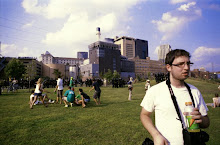While I acknowledge the efforts being made by the district attorney's office, the inspector general, and the chief of police, we have to understand that the problems of society cannot be solved in a way that people think they can. If there are an increased number of burglaries in a certain area, for example, we may think that stepping up patrols around that area will solve the problem. We'll increase the likelihood of catching the criminal, right? Hypervigilance will not solve crime, nor can hopes and dreams. So what does solve crime? Understanding, intimately, why the problems exist to begin with will allow us to proactively solve the problem. So where do our problems begin? In our economies. Weak economies lead to higher crime rates. Cities that have less unemployment, smaller homeless populations, and fewer abandoned or condemned buildings generally experience less crime.
When we were in New Orleans, we were reminded on a regular basis that government assistance was slow in coming. Getting rid of the bureaucracy would alleviate a lot of the problems that homeowners are facing, not to mention a restored sense of normalcy. Additionally, we can give landlords tax credits and grants to rebuild abandoned and condemned properties. Also, we can increase New Orleans' capacity for social work to make those that are homeless employable again. Whether that's through vocational education or simply by offering psychological help, we can take an unskilled workforce and give them skills, like carpentry or bricklaying. These things would have a relatively short training period and make them available to work on a team fairly quickly. At the same time, they can use the money they get from their job and put it to use on further education, such as business management or construction management.
I realize that the infrastructure doesn't exist and it takes time to put this infrastructure in place, but if members of government would choose to understand the problem instead of trying to throw all of their resources into fighting it, they would be more motivated. In the end, it may become more economically responsible to understand the problem. Remember the "War on Drugs"? We've poured a lot of money into that. What about the "War on Terror"? How much money have we blasted away on that without any results? What about AIDS in Africa? We've thrown a lot of money at that with very little results. Why have these three things failed? Because we refuse to acknowledge what the heart of the problem is. All the money in the world couldn't fix those problems without understanding them on a base level.
Join Us This Summer
13 years ago




2 comments:
CNN is doing this Heroes of the Year thing on Thanksgiving--and the person Steve Ozone (our PAC member hosting our show) has been working with in New Orleans Liz McCartney, the director of the Saint Bernard Project was voted CNN hero of the year! That's the place that we had the dueling GPS fight about finding, then didn't go to!
Oh dang. We should have just parked the van and hopped the fence to get there, then, instead of futzing with the GPS's for an hour.
Post a Comment